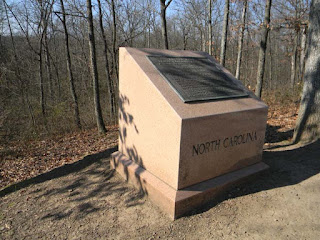When pondering the large-scale battle of Gettysburg, it’s easy to forget that each unit locked in mortal combat underwent its own isolation, a sensation of being complete alone on the battleground with only the enemy by your side. One such case was the intense firefight between the 26th North Carolina and the 24th Michigan on July 1st, 1863. The 26th North Carolina was perhaps the largest unit in the Army of Northern Virginia . . . unfortunately they were good candidates for the saying “the bigger they are, the harder they fall,” as they lost nearly 80% of their men on that first day.
 They moved into Herbst Woods (also known as McPherson’s Woods or Reynolds Woods) on McPherson’s Ridge around 3:30 in the afternoon, quickly becoming engaged by the famous Union Iron Brigade consisting of the 2nd, 6th, and 7th Wisconsin, the 19th Indiana, and the 24th Michigan. Michigan and North Carolina went head-to-head. For hours the “Tarheels” and the “Wolverines” poured fire into each other’s ranks, fighting what would become known as possibly the most intense fighting in the entire battle of Gettysburg. Casualties included Col. Henry Burgwyn, an able commander and a gallant soldier. It is said that fourteen color bearers of the 26th were lost during that engagement.
They moved into Herbst Woods (also known as McPherson’s Woods or Reynolds Woods) on McPherson’s Ridge around 3:30 in the afternoon, quickly becoming engaged by the famous Union Iron Brigade consisting of the 2nd, 6th, and 7th Wisconsin, the 19th Indiana, and the 24th Michigan. Michigan and North Carolina went head-to-head. For hours the “Tarheels” and the “Wolverines” poured fire into each other’s ranks, fighting what would become known as possibly the most intense fighting in the entire battle of Gettysburg. Casualties included Col. Henry Burgwyn, an able commander and a gallant soldier. It is said that fourteen color bearers of the 26th were lost during that engagement.
When the smoke cleared, the 26th North Carolina was utterly broken. They had lost over 550 men. Yet this sacrifice did not prevent them from being funneled into the infamous Pickett-Pettigrew-Trimble Charge two days later. It was grievously appropriate that they incurred the nickname of “Bloody 26th.” Whatever men had survived the initial onslaught found themselves in the most trying circumstances of their lives. 800 men of the 26th had come to Gettysburg. Only about 70 left.
The 26th North Carolina memorial in Herbst Woods was dedicated in the late 1980s. It somberly faces the statue-topped 24th Michigan monument across the road, the two monuments staring each other down just as the men of both units did in real life. In my opinion, these woods are some of the most peaceful of the battlefield, and the road, known as Stone-Meredith Avenue, is often quiet. Such irony is staggering.
**HONORED TODAY**
PVT. JOEL J. SMITH
Died July 03, 1863
(c) 2013 Skies of Blue and Gray



No comments:
Post a Comment